|
General interest material about game theory and related topics.
  What is Game Theory? Read more about Game Theory. What is Game Theory? Read more about Game Theory.
  Questions about economic or game theory? Try the forum. Questions about economic or game theory? Try the forum.
  Intellectual
Property (with Michele Boldrin);
check out the bibliography. Intellectual
Property (with Michele Boldrin);
check out the bibliography.
  Play a game: challenge the on-line forecaster, engage in the cooperative learning game or solve a
game using the zero-sum game solver.
Play a game: challenge the on-line forecaster, engage in the cooperative learning game or solve a
game using the zero-sum game solver.
  Computer Stuff Computer Stuff
  Good quotations
Good quotations
 Bryan Ellickson:
In early August we lost a beautiful mind. What Bryan Ellickson meant to me.
[Posted at 09/04/2024 01:31 AM by David K. Levine Bryan Ellickson:
In early August we lost a beautiful mind. What Bryan Ellickson meant to me.
[Posted at 09/04/2024 01:31 AM by David K. Levine  ] ]
 Behavioral Mechanism Design:
Those of us who have analyzed experimental data or watched participants in the laboratory have noticed that while some people seem to be inattentive and unpredictable others seem to be striving to create incentives for good social outcomes. I developed a formal model of noise, ethical, and selfish players in a new paper "Behavioral Mechanism Design as a Benchmark for Experimental Studies." The remarkable fact is that calibrating the model to data on non-strategic decision problems does a remarkably good job in predicting quantitatively what happens in experiments involving strategic interactions.
[Posted at 06/30/2024 03:19 AM by David K. Levine Behavioral Mechanism Design:
Those of us who have analyzed experimental data or watched participants in the laboratory have noticed that while some people seem to be inattentive and unpredictable others seem to be striving to create incentives for good social outcomes. I developed a formal model of noise, ethical, and selfish players in a new paper "Behavioral Mechanism Design as a Benchmark for Experimental Studies." The remarkable fact is that calibrating the model to data on non-strategic decision problems does a remarkably good job in predicting quantitatively what happens in experiments involving strategic interactions.
[Posted at 06/30/2024 03:19 AM by David K. Levine  ] ]
 The Skeptical Economist: Complex Systems and Social Incentives: The Skeptical Economist: Complex Systems and Social Incentives:
 My inaugural lecture at Royal Holloway. You can view the slides here.
[Posted at 06/12/2024 01:36 AM by David K. Levine My inaugural lecture at Royal Holloway. You can view the slides here.
[Posted at 06/12/2024 01:36 AM by David K. Levine  ] ]
 Appeasement and Deterrence:
Lee Ohanian and I have a new paper arguing that appeasement is under-appreciated: When to Appease and When to Punish: Hitler, Putin, and Hamas
[Posted at 04/07/2024 01:36 AM by David K. Levine Appeasement and Deterrence:
Lee Ohanian and I have a new paper arguing that appeasement is under-appreciated: When to Appease and When to Punish: Hitler, Putin, and Hamas
[Posted at 04/07/2024 01:36 AM by David K. Levine  ] ]
 Conflict in Ukraine:
Some thoughts about the future of the conflict in Ukraine on the EUI Blog.
[Posted at 11/28/2023 02:37 AM by David K. Levine Conflict in Ukraine:
Some thoughts about the future of the conflict in Ukraine on the EUI Blog.
[Posted at 11/28/2023 02:37 AM by David K. Levine  ] ]
 Tale of two cities:
In September I am excited to be moving to Royal Holloway University of London to take up a Leverhulme International Professorship.
[Posted at 05/30/2023 12:53 AM by David K. Levine Tale of two cities:
In September I am excited to be moving to Royal Holloway University of London to take up a Leverhulme International Professorship.
[Posted at 05/30/2023 12:53 AM by David K. Levine  ] ]
 Social Mechanisms and Political Economy: The Book:
Our new book available for download: Levine, Mattozzi and Modica study how special interests such as cartels and lobbyists together with political parties influence our well-being. Drawing on existing and ongoing theoretical, empirical, and experimental research by the authors and others, the book develops a unified theory of peer pressure and social networks. The theory is firmly grounded in modern economic and game theory and is based on incentive constraints, auction theory, learning theory, and stochastic evolution.
[Posted at 12/19/2022 02:51 AM by David K. Levine Social Mechanisms and Political Economy: The Book:
Our new book available for download: Levine, Mattozzi and Modica study how special interests such as cartels and lobbyists together with political parties influence our well-being. Drawing on existing and ongoing theoretical, empirical, and experimental research by the authors and others, the book develops a unified theory of peer pressure and social networks. The theory is firmly grounded in modern economic and game theory and is based on incentive constraints, auction theory, learning theory, and stochastic evolution.
[Posted at 12/19/2022 02:51 AM by David K. Levine  ] ]
 Podcast on Intellectual Property:
An interview by Niklas Anzinger about regulation,
innovation, and intellectual property
[Posted at 11/16/2022 02:27 AM by David K. Levine Podcast on Intellectual Property:
An interview by Niklas Anzinger about regulation,
innovation, and intellectual property
[Posted at 11/16/2022 02:27 AM by David K. Levine  ] ]
 In Memoriam: Axel Leijonhufvud:
An appreciation of Axel as a man and an economist here. My friend Roger Farmer has an appreciation here.
[Posted at 05/09/2022 12:20 AM by David K. Levine In Memoriam: Axel Leijonhufvud:
An appreciation of Axel as a man and an economist here. My friend Roger Farmer has an appreciation here.
[Posted at 05/09/2022 12:20 AM by David K. Levine  ] ]
 Tale of Two Subsidies: Why the Afghan Army did Not Fight but the Ukrainian Army Did:
See the video or read the paper.
[Posted at 04/17/2022 07:14 AM by David K. Levine Tale of Two Subsidies: Why the Afghan Army did Not Fight but the Ukrainian Army Did:
See the video or read the paper.
[Posted at 04/17/2022 07:14 AM by David K. Levine  ] ]
 Who cares about patent waivers for vaccines?:
Roughly speaking the answer should be "nobody." A short article by Michele Boldrin, Flavio Toxvaerd and myself.
[Posted at 05/15/2021 04:41 AM by David K. Levine Who cares about patent waivers for vaccines?:
Roughly speaking the answer should be "nobody." A short article by Michele Boldrin, Flavio Toxvaerd and myself.
[Posted at 05/15/2021 04:41 AM by David K. Levine  ] ]
 Data Analytics and Covid-19:
A video of a discussion of role and importance of social science data analysis in combating the pandemic at Bocconi.
[Posted at 04/24/2021 03:24 AM by David K. Levine Data Analytics and Covid-19:
A video of a discussion of role and importance of social science data analysis in combating the pandemic at Bocconi.
[Posted at 04/24/2021 03:24 AM by David K. Levine  ] ]
 Are vaccination pauses a good idea?: Are vaccination pauses a good idea?:

Peter Hansen and I think not: we have written an essay explaining why not If you agree please share it.
[Posted at 04/22/2021 05:08 AM by David K. Levine  ] ]
 Forecasting elections:
It is all about voter turnout. Here is what 538 does not understand.
[Posted at 11/02/2020 05:37 AM by David K. Levine Forecasting elections:
It is all about voter turnout. Here is what 538 does not understand.
[Posted at 11/02/2020 05:37 AM by David K. Levine  ] ]
 Monopoly:
The modern field of industrial organization seems to have spent decades chasing itself into smaller and smaller circles while the real and serious problems of monopoly go ignored. James A. Schmitz, Jr. is trying to remedy this with his monumental indictment of modern monopoly: read his book Monopolies Inflict Great Harm on Low- and Middle-Income Americans Or get a taste of it with his shorter articles on his website.
[Posted at 05/23/2020 02:17 AM by David K. Levine Monopoly:
The modern field of industrial organization seems to have spent decades chasing itself into smaller and smaller circles while the real and serious problems of monopoly go ignored. James A. Schmitz, Jr. is trying to remedy this with his monumental indictment of modern monopoly: read his book Monopolies Inflict Great Harm on Low- and Middle-Income Americans Or get a taste of it with his shorter articles on his website.
[Posted at 05/23/2020 02:17 AM by David K. Levine  ] ]
 Covid 19:
A group of economists and scientists planning how to get us out of this mess.
[Posted at 03/26/2020 12:11 PM by David K. Levine Covid 19:
A group of economists and scientists planning how to get us out of this mess.
[Posted at 03/26/2020 12:11 PM by David K. Levine  ] ]
 Global Warming: What Sort of Mess Have We Made:
An essay detailing my conclusions from reading the economic literature on climate change.
[Posted at 12/03/2019 04:33 AM by David K. Levine Global Warming: What Sort of Mess Have We Made:
An essay detailing my conclusions from reading the economic literature on climate change.
[Posted at 12/03/2019 04:33 AM by David K. Levine  ] ]
 Intervention: Intervention:

and peace?
[Posted at 10/18/2018 02:29 AM by David K. Levine  ] ]
 An Interview with an Economist:
An economist speaks (me) . A nice interview by Arnaud Marthouret:. Arnaud runs an architectural photography business. Yes I do know some real people!
[Posted at 08/15/2018 03:04 AM by David K. Levine An Interview with an Economist:
An economist speaks (me) . A nice interview by Arnaud Marthouret:. Arnaud runs an architectural photography business. Yes I do know some real people!
[Posted at 08/15/2018 03:04 AM by David K. Levine  ] ]
 Elon Musk and Me:
An article Newsweek about the concept and benefits of open patents: "open patents could bring monetary gain sooner. 'Even though you only have a share of the market,' Levine says, 'you have a share of a growing market rather than a larger share of a not-growing market.'"
[Posted at 06/06/2018 01:09 AM by David K. Levine Elon Musk and Me:
An article Newsweek about the concept and benefits of open patents: "open patents could bring monetary gain sooner. 'Even though you only have a share of the market,' Levine says, 'you have a share of a growing market rather than a larger share of a not-growing market.'"
[Posted at 06/06/2018 01:09 AM by David K. Levine  ] ]
 How I became an economist:
As told to some fellow UCLA alums
[Posted at 10/09/2017 04:32 AM by David K. Levine How I became an economist:
As told to some fellow UCLA alums
[Posted at 10/09/2017 04:32 AM by David K. Levine  ] ]
 Lies and damn lies:
A new essay Confirmatory Bias, the Bayesian Detective and an Inconvenient Truth[Posted at 09/14/2017 01:29 PM by David K. Levine Lies and damn lies:
A new essay Confirmatory Bias, the Bayesian Detective and an Inconvenient Truth[Posted at 09/14/2017 01:29 PM by David K. Levine  ] ]
 Perilous Populism:
We have a new website about the perils of populism discussing our research on democracy, corruption, lobbying and the behavior of political groups and how it may help.
[Posted at 04/18/2017 05:13 AM by David K. Levine Perilous Populism:
We have a new website about the perils of populism discussing our research on democracy, corruption, lobbying and the behavior of political groups and how it may help.
[Posted at 04/18/2017 05:13 AM by David K. Levine  ] ]
 Why Polls Are Wrong:
I do not expect polls or pundits to predict elections. Here is why.
[Posted at 11/10/2016 08:55 AM by David K. Levine Why Polls Are Wrong:
I do not expect polls or pundits to predict elections. Here is why.
[Posted at 11/10/2016 08:55 AM by David K. Levine  ] ]
 Evolution in Action:
An interview with Federico Weinschelbaum about our paper Levine, D. K., S. Modica, F. Weinschelbaum and F. Zurita [2015]: "Evolving to the Impatience Trap: The Example of the Farmer-Sheriff Game," AEJ: Microeconomics, 7: 295-317. In Spanish, English translation from Federico here
[Posted at 08/27/2016 07:55 AM by David K. Levine Evolution in Action:
An interview with Federico Weinschelbaum about our paper Levine, D. K., S. Modica, F. Weinschelbaum and F. Zurita [2015]: "Evolving to the Impatience Trap: The Example of the Farmer-Sheriff Game," AEJ: Microeconomics, 7: 295-317. In Spanish, English translation from Federico here
[Posted at 08/27/2016 07:55 AM by David K. Levine  ] ]
 In Memoriam June 12, 2016 David Backus::
A longtime friend and a great economist. See the Backus webpage for more information.
[Posted at 06/15/2016 08:17 AM by David K. Levine In Memoriam June 12, 2016 David Backus::
A longtime friend and a great economist. See the Backus webpage for more information.
[Posted at 06/15/2016 08:17 AM by David K. Levine  ] ]
 Special Issue of Games and Economic Behavior in Honor of Lloyd Shapley:
The call for papers is out
[Posted at 05/21/2016 01:15 AM by David K. Levine Special Issue of Games and Economic Behavior in Honor of Lloyd Shapley:
The call for papers is out
[Posted at 05/21/2016 01:15 AM by David K. Levine  ] ]
 SSRN:
For economists concerned about Elsevier taking over SSRN and wishing to archive their papers in a repository that is indexed by RePEc (and hence Google): you may not be aware that RePEc has an archiving service the Munich Personal RePEc Archive.
[Posted at 05/17/2016 11:52 PM by David K. Levine SSRN:
For economists concerned about Elsevier taking over SSRN and wishing to archive their papers in a repository that is indexed by RePEc (and hence Google): you may not be aware that RePEc has an archiving service the Munich Personal RePEc Archive.
[Posted at 05/17/2016 11:52 PM by David K. Levine  ] ]
 Reading List on Institutions and History:
The list of books we have been reading in our reading group.
[Posted at 01/25/2016 01:14 AM by David K. Levine Reading List on Institutions and History:
The list of books we have been reading in our reading group.
[Posted at 01/25/2016 01:14 AM by David K. Levine  ] ]
 Jean Tirole:
My remarks last year when Jean received the honorary doctorate from the EUI.
[Posted at 01/25/2016 01:12 AM by David K. Levine Jean Tirole:
My remarks last year when Jean received the honorary doctorate from the EUI.
[Posted at 01/25/2016 01:12 AM by David K. Levine  ] ]
 The Keynesian Illusion:
Explained here
[Posted at 03/15/2015 02:14 AM by David K. Levine The Keynesian Illusion:
Explained here
[Posted at 03/15/2015 02:14 AM by David K. Levine  ] ]
 NPR on Patents:
An NPR program on patents based on an interview with Michele and me.
[Posted at 07/31/2014 04:05 AM by David K. Levine NPR on Patents:
An NPR program on patents based on an interview with Michele and me.
[Posted at 07/31/2014 04:05 AM by David K. Levine  ] ]
 Classroom Games:
If you are a fan of classroom experiments, you should take a look at Walter Yuan's Classroom Games:
If you are a fan of classroom experiments, you should take a look at Walter Yuan's  Walter wrote most of the software for SSEL and CASSEL and with a lot of input from top experimentalists has designed some really good classroom software.
[Posted at 04/26/2014 05:58 AM by David K. Levine Walter wrote most of the software for SSEL and CASSEL and with a lot of input from top experimentalists has designed some really good classroom software.
[Posted at 04/26/2014 05:58 AM by David K. Levine  ] ]
 Free Online Classroom Games:
Nicolas Gruyer has a very nice site with games you can use for economics in your classroom. Take a look!
[Posted at 07/08/2013 03:44 AM by David K. Levine Free Online Classroom Games:
Nicolas Gruyer has a very nice site with games you can use for economics in your classroom. Take a look!
[Posted at 07/08/2013 03:44 AM by David K. Levine  ] ]
 Review of Acemoglu and Robinson's Why Nations Fail:
Can we explain the world by extractive and inclusive political institutions?
[Posted at 09/30/2012 12:55 AM by David K. Levine Review of Acemoglu and Robinson's Why Nations Fail:
Can we explain the world by extractive and inclusive political institutions?
[Posted at 09/30/2012 12:55 AM by David K. Levine  ] ]
 Is Behavioral Economics Doomed?: Is Behavioral Economics Doomed?:
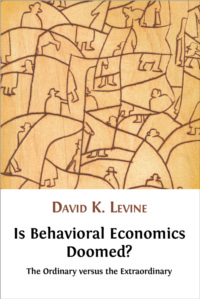
Now available everywhere From Openbook Publishers - a new open access book about traditional and behavioral economics.
[Posted at 06/20/2012 08:05 AM by David K. Levine  ] ]
 The Ordinary Versus the Extraordinary: The Ordinary Versus the Extraordinary:

NEW: Chapter 8 and 9 posted. Chapters of a new open access book about traditional and behavioral economics.
[Posted at 02/03/2011 07:45 AM by David K. Levine  ] ]
 NSF Economics in the Future:
White papers by economists about the future of economics.
[Posted at 01/31/2011 01:03 PM by David K. Levine NSF Economics in the Future:
White papers by economists about the future of economics.
[Posted at 01/31/2011 01:03 PM by David K. Levine  ] ]
 In Memoriam December 6, 2010 Robert A. Levine: In Memoriam December 6, 2010 Robert A. Levine:
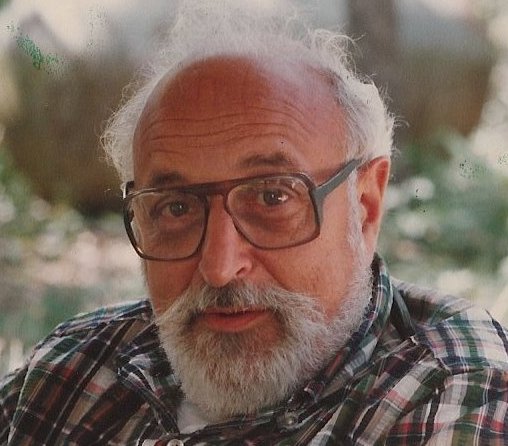
My father - a giant of a man and always my inspiration. For the moment you can find some information about him here. Slideshow from the memorial.
[Posted at 12/07/2010 07:15 AM by David K. Levine  ] ]  In Memoriam July 29, 2010 Earl Thompson: In Memoriam July 29, 2010 Earl Thompson:

Earl Thompson, economist: born October 15, 1938; Assistant Professor, Stanford University 1962-1965, Assistant Professor UCLA 1965-1969, Associate Professor, UCLA 1969-1973; Professor, Department of Economics, UCLA 1973; married 1961 Velma Montoya (one son); died Los Angeles 29 July 2010.
Thompson was an idiosyncratic but brilliant thinker, and his death marks the end of an era for UCLA: Thompson is the last of the economists brought to UCLA by Armen Alchian in the 1960s to create the famed UCLA school of economics.
Thompson's interests in economics were broad ranging. In recent years his goal was to provide an integrated theory of the vital institutions of society - a theory that tied together historical events with economic theory and politics. The basic elements of the theory were outlined in his 2001 book with Charles Hickson. The entire theory was to appear in the three volumes entitled A Reconstruction of Economics.
Thompson did not set out to be an economist. His ambition until his early twenties was to be a professional baseball player. Fortunately for us he fell to injury, so instead became an academic. He attended UCLA as an undergraduate where he studied under Armen Alchian who turned him towards economics, and while in his younger years he had been an indifferent student, he graduated with Honors in 1958. He attended the London School of Economics, then returned to Harvard for his Ph.D. under the supervision of John R. Meyer, becoming Harvard's youngest Ph.D. in Economics in 1961. His first longterm position was as an assistant professor at Stanford University. In 1965 he moved back to Los Angeles to UCLA, where he spent the bulk of his career.
Over that career Thompson published more than 40 articles, many in the top academic journals. He wrote on topics ranging from monetary theory to welfare economics. Always his focus was on the winners and losers from economic policy. In monetary theory he was profoundly skeptical of the influence of bankers on monetary policy - as we have recently been reminded, bankers look out for bankers' interests, not the interests of the rest of us. As recently as March Thompson was writing in the AmericanThinker.com explaining why the banker driven bailout and stimulus policies might benefit bankers, but would be of little use to the rest of us.
Thompson was also cognizant of the universal desire for monopoly. He was one of the first to point to collusion between unions and firms - unions are not subject to anti-trust laws. He gathered substantial evidence that in the coal industry strikes served to raise prices and increase profits by restricting output.
One of Thompson's most significant theoretical contributions was in the area of public finance. Conventional wisdom among economists is that taxing capital is a poor idea. Thompson pointed out that the national defense is one of the primary functions of government - and the beneficiaries are largely the owners of capital. Far from an inefficient drag on the economy, he argued, capital taxes are effectively a user fee, charging those that benefit the most from defense for its cost. That democratic institutions seemed to have found the right solution where economists had not made a profound impression on him.
Thompson made major theoretical contributions to the study of commitment in games - arguing that it has an empirical significance that is underplayed by economists and game theorists. In doing so, he demonstrated a formal mathematical version of what is sometimes known as the Coase Theorem: that without frictions an economy attains desirable outcomes even in the absence of competition. Where other economists focused on markets Thompson focused on the evolution of democratic political institutions, arguing that the democratic process tended to bring forth efficient policy compromises.
Thompson loved to work with students, although occasionally his classes met at odd times, such as Sunday afternoons. Many of his students became coauthors and lifelong friends.
In the early 1980s, while his wife Velma Montoya served in the Reagan White House, Thompson spent a year at the Federal Trade Commission in Washington. This gave him an opportunity to comment on and influence public policy: although a theorist Thompson had an enormously practical side and cared deeply about people and policy.
Thompson received numerous grants and awards to support his research, including from the UCLA Institute for Government and Public Affairs; the Ford Foundation; the Eli Lilly Foundation; the American Petroleum Institute; the Koch Foundation; the Foundation for Research in Economics and Education; and the National Science Foundation.
Earl Thompson was an eccentric in an age of conformity. He kept odd hours: he was alone in his office in Bunche Hall at 4:31 AM on January 17, 1994 when the Northridge earthquake hit, where he found himself unharmed but covered with fallen books. He loved muscle cars, dressed as if the 1950s were just yesterday, and always had a sneaky grin on his face. He will be missed by his colleagues, his students, his friends and his family.
[Posted at 07/30/2010 10:24 AM by David K. Levine  ] ]  Risk and Uncertainty: Risk and Uncertainty:
 [Posted at 06/17/2010 06:12 AM by David K. Levine
[Posted at 06/17/2010 06:12 AM by David K. Levine  ] ]
 Is Economics a Science:
For a guy who thinks that methodological disputes are boring and that the proof of the pudding is in the eating, I seem to be getting in to a lot of them lately. First we had to listen to Paul Krugman spouting about how bad economics was when he was a graduate student. You can find a brief effort to bring him up to date on developments in the last three decades here. This led to a debate with philosopher of science Alex Rosenberg on bloggingheads tv. It's mostly an elaboration on my "Is Behavioral Economics Doomed" - although I'd have thought that the fact that the Keynesian theory that Paul likes was extensively examined for two decades and ultimately rejected because it was falsified would be evidence that economics is a science. I guess it isn't for Paul: for him Keynesian is an article of faith despite the fact it has been falsified.
[Posted at 10/05/2009 11:44 AM by David K. Levine Is Economics a Science:
For a guy who thinks that methodological disputes are boring and that the proof of the pudding is in the eating, I seem to be getting in to a lot of them lately. First we had to listen to Paul Krugman spouting about how bad economics was when he was a graduate student. You can find a brief effort to bring him up to date on developments in the last three decades here. This led to a debate with philosopher of science Alex Rosenberg on bloggingheads tv. It's mostly an elaboration on my "Is Behavioral Economics Doomed" - although I'd have thought that the fact that the Keynesian theory that Paul likes was extensively examined for two decades and ultimately rejected because it was falsified would be evidence that economics is a science. I guess it isn't for Paul: for him Keynesian is an article of faith despite the fact it has been falsified.
[Posted at 10/05/2009 11:44 AM by David K. Levine  ] ]
 Rationality and Max Weber: Rationality and Max Weber:
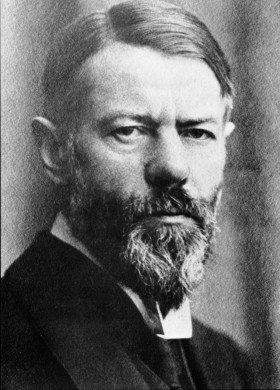 |
I recently presented a lecture "Is Behavioral Economics Doomed" at the European University Institute in Florence. It was part of a series of lectures in honor of Max Weber. Since a key issue in behavioral economics is the role of psychological phenomenon such as emotion in decision making, I was curious as to what Max Weber thought of this - Weber being a pioneer of what is now called rational choice theory. Kenneth Allan provides a nice summary of Max Weber's thinking on the topic.
Value-rational behavior is distinguished from affective action because Weber sees some semblance of self-aware decision-making processes in value-rationality. Values are emotional, but when we consciously decided to act because of the logic of our values, it is rational behavior. Emotion, on the other hand,is irrational and proceeds simply from the feelings that an actor may have in a given situation. [Chapter 5: Explorations in Classical Sociological Theory, Chapter 5, Pine Forges Press, 2005]
This is similar to the distinction, for example, that Drew Fudenberg and I draw in our work on the dual self model . Indeed Max Weber's own words about the essential irrationality of that deepest of all emotions - love - is instructive
Under these conditions, the erotic relation seems to offer the unsurpassable peak of the fulfillment of the request for love in the direct fusion of the souls of one to the other. The boundless giving of oneself is as radical as possible in its opposition to all functionality, rationality, and generality. . . It is so overpowering that it is treated "symbolically": as a sacrament. The lover realizes himself to be rooted in the kernel of the truly living, which is eternally inaccessible to any rational endeavor. He knows himself to be freed from the cold skeleton hands of rational orders, just as completely as from the banality of everyday routine. [Max Weber, Zwischenbetrachtung, 1958]
|
[Posted at 07/28/2009 05:54 AM by David K. Levine  ] ] In the media:
If you want media attention, working on sexy topics like behavioral economics apparently pays off...
[Posted at 03/12/2009 01:42 AM by David K. Levine In the media:
If you want media attention, working on sexy topics like behavioral economics apparently pays off...
[Posted at 03/12/2009 01:42 AM by David K. Levine  ] ]
 A Long Run Collaboration: A Long Run Collaboration:
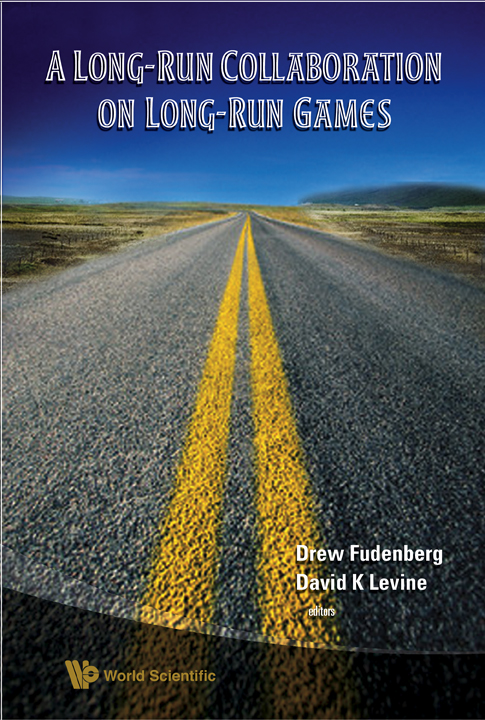
A Long Run Collaboration on Long Run Games bringing together Drew's and my work on the subject from the early 1980s to the present.
[Posted at 01/20/2009 01:08 PM by David K. Levine  ] ]
 In Memoriam June 24, 2008: Leo Hurwicz: In Memoriam June 24, 2008: Leo Hurwicz:
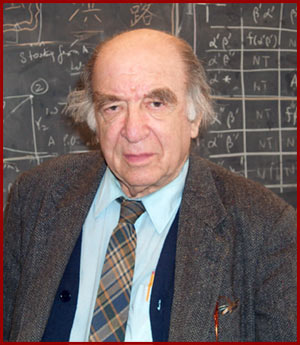
From Eric Maskin
Leo made seminal contributions to economics. In particular, he created
the modern theory of mechanism design, the study of economic and
political institutions for achieving society's goals. For this work he
received the U.S. National Medal of Science in 1990 and shared the Nobel
Memorial Prize in Economics in 2007, among many other honors. He was
also an institution designer in the practical sense: he bears major
responsibility for turning the Economics Department at the University of
Minnesota into one of the great departments of the world. Full Obituary
Leo was my colleague when I taught at the University of Minesota, and his reputation as a kind and gentle man is well deserved. He was a leader in the best sense of the word: he led by example.
[Posted at 07/31/2008 07:54 AM by David K. Levine  ] ] Against Intellectual Monopoly: Against Intellectual Monopoly:
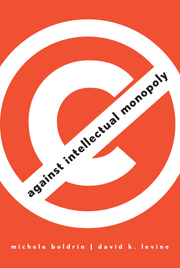
Michele's and my book about copyrights and patents from Cambridge University Press is out. You can order it on Amazon or the publisher Cambridge University Press It will remain available online. We argue that the only solution to the problem of intellectual monopoly is to get rid of it entirely.
[Posted at 07/11/2008 02:20 PM by David K. Levine  ] ]
 Against Intellectual Monopoly:
Against Intellectual Monopoly Michele's and my book about copyrights and patents from Cambridge University Press is available for pre-order from Amazon. It will remain available online. We argue that the only solution to the problem of intellectual monopoly is to get rid of it entirely.
[Posted at 06/09/2008 09:23 AM by David K. Levine Against Intellectual Monopoly:
Against Intellectual Monopoly Michele's and my book about copyrights and patents from Cambridge University Press is available for pre-order from Amazon. It will remain available online. We argue that the only solution to the problem of intellectual monopoly is to get rid of it entirely.
[Posted at 06/09/2008 09:23 AM by David K. Levine  ] ]
 Against Intellectual Monopoly:
Hopefully the final version of Michele's and my book Against Intellectual Monopoly is available on line. We argue that the only solution to the problem of intellectual monopoly is to get rid of it entirely. It is in production at Cambridge University Press and should appear in bookstores this summer.
[Posted at 01/07/2008 07:34 AM by David K. Levine Against Intellectual Monopoly:
Hopefully the final version of Michele's and my book Against Intellectual Monopoly is available on line. We argue that the only solution to the problem of intellectual monopoly is to get rid of it entirely. It is in production at Cambridge University Press and should appear in bookstores this summer.
[Posted at 01/07/2008 07:34 AM by David K. Levine  ] ]
 Experimental Economics:
Some ramblings here.
[Posted at 12/27/2007 09:59 AM by David K. Levine Experimental Economics:
Some ramblings here.
[Posted at 12/27/2007 09:59 AM by David K. Levine  ] ]
 My Other Life: Via Christian Zimmerman My Other Life: Via Christian Zimmerman
[Posted at 12/20/2007 10:55 AM by David K. Levine  ] ]  Mechanism Design: Mechanism Design:
 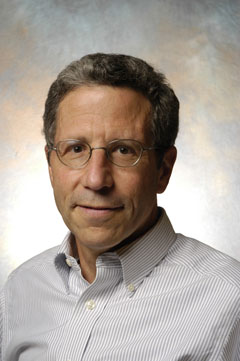 
"information about individual preferences and available production technologies is usually dispersed among many actors who may use their private information to further their own interests. Mechanism design theory, initiated by Leonid Hurwicz and further developed by Eric Maskin and Roger Myerson, has greatly enhanced our understanding of the properties of optimal allocation mechanisms in such situations, accounting for individuals' incentives and private information. The theory allows us to distinguish situations in which markets work well from those in which they do not. It has helped economists identify efficient trading mechanisms, regulation schemes and voting procedures. Today, mechanism design theory plays a central role in many areas of economics and parts of political science." announcement here
[Posted at 10/15/2007 06:06 AM by David K. Levine  ] ]  Worth Taking a Look:
A new creative commons freely redistributable journal in economics - economics.
[Posted at 03/14/2007 06:14 AM by David K. Levine Worth Taking a Look:
A new creative commons freely redistributable journal in economics - economics.
[Posted at 03/14/2007 06:14 AM by David K. Levine  ] ]
 Against Intellectual Monopoly:
The latest and newest version of Michele's and my book Against Intellectual Monopoly is available on line. We argue that the only solution to the problem of intellectual monopoly is to get rid of it entirely.
[Posted at 01/23/2007 11:10 AM by David K. Levine Against Intellectual Monopoly:
The latest and newest version of Michele's and my book Against Intellectual Monopoly is available on line. We argue that the only solution to the problem of intellectual monopoly is to get rid of it entirely.
[Posted at 01/23/2007 11:10 AM by David K. Levine  ] ]
 Video recollections of Jack Hirshleifer:
Now available on line: video of our recollections of Jack at the Hirshleifer conference:
first part,
second part,
third part
(note: these files are quite large around 200M)
[Posted at 06/12/2006 03:15 PM by David K. Levine Video recollections of Jack Hirshleifer:
Now available on line: video of our recollections of Jack at the Hirshleifer conference:
first part,
second part,
third part
(note: these files are quite large around 200M)
[Posted at 06/12/2006 03:15 PM by David K. Levine  ] ]
 Moving:
I am leaving the faculty at UCLA to join the faculty at Washington University in St. Louis at the end of June. It is with sadness that I leave UCLA where I have taught for 25 years and all my great friends and colleagues in Los Angeles. I warn all of you that you will probably not be able to escape me entirely. It is with excitement that I look forward to coming to Washington University and my great friends and new colleagues in St. Louis.
[Posted at 05/05/2006 05:29 PM by David K. Levine Moving:
I am leaving the faculty at UCLA to join the faculty at Washington University in St. Louis at the end of June. It is with sadness that I leave UCLA where I have taught for 25 years and all my great friends and colleagues in Los Angeles. I warn all of you that you will probably not be able to escape me entirely. It is with excitement that I look forward to coming to Washington University and my great friends and new colleagues in St. Louis.
[Posted at 05/05/2006 05:29 PM by David K. Levine  ] ]
 Interview on Experimental Economics:
Christian Zimmermann interviewed me for the Economic Dynamics newsletter. The interview is primarily about experimental economics and the role of endogenous interpersonal preferences.
[Posted at 05/03/2006 10:44 AM by David K. Levine Interview on Experimental Economics:
Christian Zimmermann interviewed me for the Economic Dynamics newsletter. The interview is primarily about experimental economics and the role of endogenous interpersonal preferences.
[Posted at 05/03/2006 10:44 AM by David K. Levine  ] ]
 New Blog About IP Related Issues:
Go to http://www.againstmonopoly.org for our latest postings on how monopoly inhibits innovation and how to protect innovation.
[Posted at 04/23/2006 06:36 AM by David K. Levine New Blog About IP Related Issues:
Go to http://www.againstmonopoly.org for our latest postings on how monopoly inhibits innovation and how to protect innovation.
[Posted at 04/23/2006 06:36 AM by David K. Levine  ] ]
 New: Research Paper Podcasts:
Get 'em at http://www.dklevine.com/papers.htm
[Posted at 03/29/2006 02:39 PM by David K. Levine New: Research Paper Podcasts:
Get 'em at http://www.dklevine.com/papers.htm
[Posted at 03/29/2006 02:39 PM by David K. Levine  ] ]
 Hirshleifer Conference:
The Conference in Honor of Jack Hirshleifer took place as scheduled Friday-Saturday March 10-11, 2006 at UCLA. The complete program as well as most of the papers are available at the conference website. We had a great turnout, many great presentations, and shared fine memories of Jack. We videotaped the remembrances of Jack and hope to make the video available soon.
[Posted at 03/28/2006 09:57 AM by David K. Levine Hirshleifer Conference:
The Conference in Honor of Jack Hirshleifer took place as scheduled Friday-Saturday March 10-11, 2006 at UCLA. The complete program as well as most of the papers are available at the conference website. We had a great turnout, many great presentations, and shared fine memories of Jack. We videotaped the remembrances of Jack and hope to make the video available soon.
[Posted at 03/28/2006 09:57 AM by David K. Levine  ] ]
 Open Access in Economic Theory:
The first issue of Theoretical Economics is out. We aim to become the best specialty journal in economic theory. Vote for us.
[Posted at 03/03/2006 08:36 PM by David K. Levine Open Access in Economic Theory:
The first issue of Theoretical Economics is out. We aim to become the best specialty journal in economic theory. Vote for us.
[Posted at 03/03/2006 08:36 PM by David K. Levine  ] ]
 Careful what you wish for department:
John Thorne, a Verizon senior vice president and deputy general counsel is demanding the right to charge Google for using the Verizon network. But does he think he is going to charge Google - or is Google going to charge him for letting his network carry Google? Do owners of movie theaters charge movie producers for allowing movies to be shown in their theaters? Would you pay more or less for a Verizon internet service that didn't have Google on it? Imagine the ad campaign: "Buy Verizon - we don't offer Google."
[Posted at 02/07/2006 06:33 PM by David K. Levine Careful what you wish for department:
John Thorne, a Verizon senior vice president and deputy general counsel is demanding the right to charge Google for using the Verizon network. But does he think he is going to charge Google - or is Google going to charge him for letting his network carry Google? Do owners of movie theaters charge movie producers for allowing movies to be shown in their theaters? Would you pay more or less for a Verizon internet service that didn't have Google on it? Imagine the ad campaign: "Buy Verizon - we don't offer Google."
[Posted at 02/07/2006 06:33 PM by David K. Levine  ] ]
 Hirshleifer Conference:
A Conference in Honor of Jack Hirshleifer will take place Friday-Saturday March 10-11, 2006 at UCLA. Details at the conference website.
[Posted at 01/24/2006 01:56 PM by David K. Levine Hirshleifer Conference:
A Conference in Honor of Jack Hirshleifer will take place Friday-Saturday March 10-11, 2006 at UCLA. Details at the conference website.
[Posted at 01/24/2006 01:56 PM by David K. Levine  ] ]
 Sony-BMG: The Sony-BMG fiasco has demolished one argument for obtaining music legally rather than illegally over P2P networks. The RIAA advises against using file sharing networks because "file-sharers’ computers are vulnerable to
the viruses infecting other machines on the P2P networks." Leaving aside just how great this vulnerability is - F-Secure reports that there are no viruses to infect MP3 audio files - Sony-BMG has handily demolished this argument by planting its own malware on users computers.
[Posted at 11/29/2005 05:46 PM by David K. Levine Sony-BMG: The Sony-BMG fiasco has demolished one argument for obtaining music legally rather than illegally over P2P networks. The RIAA advises against using file sharing networks because "file-sharers’ computers are vulnerable to
the viruses infecting other machines on the P2P networks." Leaving aside just how great this vulnerability is - F-Secure reports that there are no viruses to infect MP3 audio files - Sony-BMG has handily demolished this argument by planting its own malware on users computers.
[Posted at 11/29/2005 05:46 PM by David K. Levine  ] ]
 Scott Freeman:
If you would like to learn more about Scott and his work, Preston McAfee has created a nice site in his honor.
[Posted at 10/12/2005 12:39 PM by David K. Levine Scott Freeman:
If you would like to learn more about Scott and his work, Preston McAfee has created a nice site in his honor.
[Posted at 10/12/2005 12:39 PM by David K. Levine  ] ]
 Against Intellectual Monopoly:
Updated versions of the first Against Intellectual Monopoly:
Updated versions of the first six eight chapters now online.
[Posted at 09/26/2005 12:05 PM by David K. Levine  ] ]
 Theoretical Economics:
Now taking submissions. We aim to become the best specialty journal in economic theory. Here are some photos Ariel Rubinstein took of our secret meeting in London.
[Posted at 08/04/2005 10:25 AM by David K. Levine Theoretical Economics:
Now taking submissions. We aim to become the best specialty journal in economic theory. Here are some photos Ariel Rubinstein took of our secret meeting in London.
[Posted at 08/04/2005 10:25 AM by David K. Levine  ] ]
[Posted at 07/26/2005 10:29 AM by David K. Levine  ] ] The Microsoft Thought Police:
In the war on thought thieves thought police must be the logical next step.
[Posted at 05/14/2005 10:57 AM by David K. Levine The Microsoft Thought Police:
In the war on thought thieves thought police must be the logical next step.
[Posted at 05/14/2005 10:57 AM by David K. Levine  ] ]
 Theoretical Economics:
A new very serious open access journal in economic theory. We aim to become the best specialty journal in economic theory.
[Posted at 03/31/2005 05:24 PM by David K. Levine Theoretical Economics:
A new very serious open access journal in economic theory. We aim to become the best specialty journal in economic theory.
[Posted at 03/31/2005 05:24 PM by David K. Levine  ] ]
  In Memoriam Gerard Debreu:
Dec 31, 2004. In Memoriam Gerard Debreu:
Dec 31, 2004.
[Posted at 01/22/2005 08:10 AM by David K. Levine  ] ] It's Not Rush Limbaugh:
But if you want to learn about game theory, check out The Leonard Lopate Show's "Games People Play" with Steven Brams a political scientist at NYU and me. The Real Player audio stream is here.
[Posted at 01/14/2005 03:57 PM by David K. Levine It's Not Rush Limbaugh:
But if you want to learn about game theory, check out The Leonard Lopate Show's "Games People Play" with Steven Brams a political scientist at NYU and me. The Real Player audio stream is here.
[Posted at 01/14/2005 03:57 PM by David K. Levine  ] ]
 Has Disney bought the courts along with congress:
Updated Tuesday October 25: An essay on Mickey Mouse and the economics of retroactive copyright.
[Posted at 10/14/2004 10:47 AM by David K. Levine Has Disney bought the courts along with congress:
Updated Tuesday October 25: An essay on Mickey Mouse and the economics of retroactive copyright.
[Posted at 10/14/2004 10:47 AM by David K. Levine  ] ]
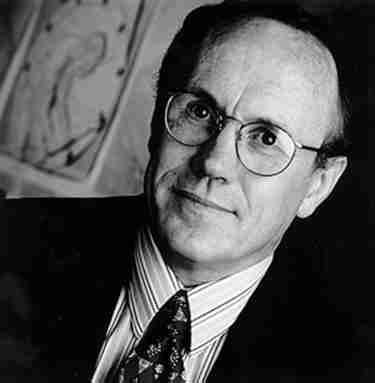 Ed Prescott and Finn Kydland Ed Prescott and Finn Kydland
"for their contributions to dynamic macroeconomics: the time consistency of economic policy and the driving forces behind business cycles;" I would have said: for instituting intellectual discipline and remaking modern macroeconomics into the form it has today. More information about Kydland and Prescott's work. Here are Matthias Doepke's pictures from the party at the Minneapolis fed. Here's a picture of Ed and Finn with the President.
[Posted at 10/11/2004 06:53 AM by David K. Levine  ] ]  New:
Read the reviews of game theory texts.
[Posted at 07/01/2004 04:11 PM by David K. Levine New:
Read the reviews of game theory texts.
[Posted at 07/01/2004 04:11 PM by David K. Levine  ] ]
 Read the latest on intellectual property:
Drafts of the first four chapters of Michele Boldrin's and my new book Against Intellectual Monopoly is available online. Information about my public lecture at Chinese U. Why "intellectual property" is not property. Check out the new IP
Bibliography. More stuff about intellectual property and intellectual monopoly (with Michele Boldrin).
[Posted at 05/24/2004 09:34 PM by David K. Levine Read the latest on intellectual property:
Drafts of the first four chapters of Michele Boldrin's and my new book Against Intellectual Monopoly is available online. Information about my public lecture at Chinese U. Why "intellectual property" is not property. Check out the new IP
Bibliography. More stuff about intellectual property and intellectual monopoly (with Michele Boldrin).
[Posted at 05/24/2004 09:34 PM by David K. Levine  ] ]
 Hot economics on the internet:
Economic Theory News lightly screened listing of the latest research in economic theory, NAJ Economics peer reviewed publication on the web
[Posted at 05/23/2004 02:14 PM by David K. Levine Hot economics on the internet:
Economic Theory News lightly screened listing of the latest research in economic theory, NAJ Economics peer reviewed publication on the web
[Posted at 05/23/2004 02:14 PM by David K. Levine  ] ]
 Experimental economics:
CASSEL the greatest social science
experimental laboratory in the world; NSF information
about human subjects research. Information for UCLA social scientists doing human subject research. Addendum 1/31/2005: The NSF site seems to have vanished. Information about the CASSEL experience with human subjects regulation can be found here. Further Addendum 1/3/2006: no one was using the hs.sscnet.ucla.edu site so it has been taken off line. However, the NSF site has reappeared here
[Posted at 05/22/2004 02:16 PM by David K. Levine Experimental economics:
CASSEL the greatest social science
experimental laboratory in the world; NSF information
about human subjects research. Information for UCLA social scientists doing human subject research. Addendum 1/31/2005: The NSF site seems to have vanished. Information about the CASSEL experience with human subjects regulation can be found here. Further Addendum 1/3/2006: no one was using the hs.sscnet.ucla.edu site so it has been taken off line. However, the NSF site has reappeared here
[Posted at 05/22/2004 02:16 PM by David K. Levine  ] ]
 A subtle bias:
Why
"intellectual property" is not property
[Posted at 10/01/2003 04:05 PM by David K. Levine A subtle bias:
Why
"intellectual property" is not property
[Posted at 10/01/2003 04:05 PM by David K. Levine  ] ]
 Who
is this man, and what did he win? Who
is this man, and what did he win?
[Posted at 03/31/2002 09:40 AM by David K. Levine  ] ] Your government at work:
Why the SSSCA is Wrong
[Posted at 03/01/2002 04:07 PM by David K. Levine Your government at work:
Why the SSSCA is Wrong
[Posted at 03/01/2002 04:07 PM by David K. Levine  ] ]
 Microsoft at work:
All hail the Borg
[Posted at 12/01/2001 04:13 PM by David K. Levine Microsoft at work:
All hail the Borg
[Posted at 12/01/2001 04:13 PM by David K. Levine  ] ]
 Your government at work:
Games schools districts play;
if you are interested in applications of game theory to school choice
have a look at Tayfun
Sönmez's work on the subject.
[Posted at 05/01/2001 04:12 PM by David K. Levine Your government at work:
Games schools districts play;
if you are interested in applications of game theory to school choice
have a look at Tayfun
Sönmez's work on the subject.
[Posted at 05/01/2001 04:12 PM by David K. Levine  ] ]
 Anthropologists at work:
While
you are boycotting rogue
journals, you might want to combat a scientific
hoax by giving W.W. Norton and the New Yorker a miss as
well.
(Thank heavens economists are so much more civilized than
anthropologists.)
[Posted at 12/31/1969 04:00 PM by David K. Levine Anthropologists at work:
While
you are boycotting rogue
journals, you might want to combat a scientific
hoax by giving W.W. Norton and the New Yorker a miss as
well.
(Thank heavens economists are so much more civilized than
anthropologists.)
[Posted at 12/31/1969 04:00 PM by David K. Levine  ] ]
 Science at work:
Additional
statement prepared for the NSF visitors committee
[Posted at 10/02/2000 04:19 PM by David K. Levine Science at work:
Additional
statement prepared for the NSF visitors committee
[Posted at 10/02/2000 04:19 PM by David K. Levine  ] ]
 The RIAA at work:
Why Napster is Right (with
Michele Boldrin)
[Posted at 10/01/2000 04:16 PM by David K. Levine The RIAA at work:
Why Napster is Right (with
Michele Boldrin)
[Posted at 10/01/2000 04:16 PM by David K. Levine  ] ]
 All about game theory:
Cognitive Science Encyclopedia submission
on game theory [revised June 2001]
[Posted at 10/01/2000 12:17 PM by David K. Levine All about game theory:
Cognitive Science Encyclopedia submission
on game theory [revised June 2001]
[Posted at 10/01/2000 12:17 PM by David K. Levine  ] ]
 Economist at work:
"Dynamics in Games" [August
2000]:
Slides from a series of lectures given at Trieste Italy for
graduate students in Physics about learning and evolutionary theory and
their role in economic dynamics.
[Posted at 08/25/2000 04:25 PM by David K. Levine Economist at work:
"Dynamics in Games" [August
2000]:
Slides from a series of lectures given at Trieste Italy for
graduate students in Physics about learning and evolutionary theory and
their role in economic dynamics.
[Posted at 08/25/2000 04:25 PM by David K. Levine  ] ]
 Economist at work:
Transcript from a talk
given at the Central Bank of Uruguay about evolutionary game
theory the evolution of altruism, spite and punishment, and
the role of imitation as contrasted with mutation.
[Posted at 08/01/2000 04:24 PM by David K. Levine Economist at work:
Transcript from a talk
given at the Central Bank of Uruguay about evolutionary game
theory the evolution of altruism, spite and punishment, and
the role of imitation as contrasted with mutation.
[Posted at 08/01/2000 04:24 PM by David K. Levine  ] ]
 New campaign:
Joined Ted Bergstrom in his campaign to stamp out rogue journals.
[Posted at 02/02/2000 09:49 AM by David K. Levine New campaign:
Joined Ted Bergstrom in his campaign to stamp out rogue journals.
[Posted at 02/02/2000 09:49 AM by David K. Levine  ] ]
 Science at work:
Statement prepared for the NSF visitors
committee explaining the benefits of NSF spending on research in
economics [February 2000]
[Posted at 02/01/2000 04:18 PM by David K. Levine Science at work:
Statement prepared for the NSF visitors
committee explaining the benefits of NSF spending on research in
economics [February 2000]
[Posted at 02/01/2000 04:18 PM by David K. Levine  ] ]
 Careful now:
Added the dangers of
forecasting.
[Posted at 01/29/2000 09:51 AM by David K. Levine Careful now:
Added the dangers of
forecasting.
[Posted at 01/29/2000 09:51 AM by David K. Levine  ] ]
 Questions:
Started the forum. This is
a game and economic theory message board system for discussing
questions about the theory and i's applications.
[Posted at 01/01/2000 09:53 AM by David K. Levine Questions:
Started the forum. This is
a game and economic theory message board system for discussing
questions about the theory and i's applications.
[Posted at 01/01/2000 09:53 AM by David K. Levine  ] ]
 A great UCLA economist:
Jack Hirshleifer
[Posted at 05/25/1999 04:22 PM by David K. Levine A great UCLA economist:
Jack Hirshleifer
[Posted at 05/25/1999 04:22 PM by David K. Levine  ] ]
 Game theory:
What is it?
[Posted at 05/25/1999 04:21 PM by David K. Levine Game theory:
What is it?
[Posted at 05/25/1999 04:21 PM by David K. Levine  ] ]
 Armen Alchian:
Added information about Armen A. Alchian and the Armen Alchian Chair in Economics
[Posted at 03/31/1998 10:17 AM by David K. Levine Armen Alchian:
Added information about Armen A. Alchian and the Armen Alchian Chair in Economics
[Posted at 03/31/1998 10:17 AM by David K. Levine  ] ]
 New section:
Added a new section with commentary on economic and
methodological problems and issues.
[Posted at 03/06/1998 10:18 AM by David K. Levine New section:
Added a new section with commentary on economic and
methodological problems and issues.
[Posted at 03/06/1998 10:18 AM by David K. Levine  ] ]
 Economist at work:
"Learning and Evolution in Games"
(with Drew Fudenberg) [July 1996]: Essay about research on
learning in games based on a plenary talk at the Econometric
Society summer meetings.
[Posted at 07/01/1996 04:26 PM by David K. Levine Economist at work:
"Learning and Evolution in Games"
(with Drew Fudenberg) [July 1996]: Essay about research on
learning in games based on a plenary talk at the Econometric
Society summer meetings.
[Posted at 07/01/1996 04:26 PM by David K. Levine  ] ]
 Economist at work:
"Learning in Games"[June
1996]: Presentation for computer scientists on what problems in
game theory motivate economists to be interested in learning.
[Posted at 06/05/1996 04:27 PM by David K. Levine Economist at work:
"Learning in Games"[June
1996]: Presentation for computer scientists on what problems in
game theory motivate economists to be interested in learning.
[Posted at 06/05/1996 04:27 PM by David K. Levine  ] ]
 Economist at work:
"Remarks on Evolution and Learning"[September
1995]: Discussion at World Econometric Society Meetings of review
papers on evolution and learning on games
[Posted at 09/01/1995 04:29 PM by David K. Levine Economist at work:
"Remarks on Evolution and Learning"[September
1995]: Discussion at World Econometric Society Meetings of review
papers on evolution and learning on games
[Posted at 09/01/1995 04:29 PM by David K. Levine  ] ]
 Economist at work:
"Harsanyi, Nash and Selten" [June
1995]:
Abstract of a lecture about the work of these Nobel Prize winners
in Economics.
[Posted at 06/10/1995 04:28 PM by David K. Levine Economist at work:
"Harsanyi, Nash and Selten" [June
1995]:
Abstract of a lecture about the work of these Nobel Prize winners
in Economics.
[Posted at 06/10/1995 04:28 PM by David K. Levine  ] ]
 Econometrics at work:
Let's put the econ back into econometrics 1:
Commentary: A 500 batting average is pretty good, right?
[Posted at 05/25/1994 04:30 PM by David K. Levine Econometrics at work:
Let's put the econ back into econometrics 1:
Commentary: A 500 batting average is pretty good, right?
[Posted at 05/25/1994 04:30 PM by David K. Levine  ] ]
 Econometrics at work:
Let's put the econ back into econometrics 2:
Commentary: A sample of size 100 is large?
[Posted at 05/24/1994 04:30 PM by David K. Levine Econometrics at work:
Let's put the econ back into econometrics 2:
Commentary: A sample of size 100 is large?
[Posted at 05/24/1994 04:30 PM by David K. Levine  ] ]
 "Practical
men, who believe themselves to be quite exempt from any
intellectual influences, are usually the slaves of some defunct
economist." John Maynard Keynes "Practical
men, who believe themselves to be quite exempt from any
intellectual influences, are usually the slaves of some defunct
economist." John Maynard Keynes
 "everything which
[was] not permitted [was] forbidden. . . . [W]hatever [was] permitted
[was] mandatory. . . . Citizens were shackled in their actions by the
universal passion for banning things." Boris Yeltsin "everything which
[was] not permitted [was] forbidden. . . . [W]hatever [was] permitted
[was] mandatory. . . . Citizens were shackled in their actions by the
universal passion for banning things." Boris Yeltsin
 "People
of the same trade seldom meet together, even for merriment and
diversion, but the conversation ends in a conspiracy against the
public, or in some contrivance to raise prices." Adam
Smith "People
of the same trade seldom meet together, even for merriment and
diversion, but the conversation ends in a conspiracy against the
public, or in some contrivance to raise prices." Adam
Smith
 "The
Americans love Pepsi-Cola, we love death." Maulana Inyadullah;
"Well, it's January and I'm drinking a Pepsi and Mr. Inyadullah
is probably dead. So...the war had a happy ending for everyone." oldmanmurray.com "The
Americans love Pepsi-Cola, we love death." Maulana Inyadullah;
"Well, it's January and I'm drinking a Pepsi and Mr. Inyadullah
is probably dead. So...the war had a happy ending for everyone." oldmanmurray.com
 "If
our biggest problem in Germany is whether our chancellor dyes his
hair, then things seem to be going well for us here." Udo Walz "If
our biggest problem in Germany is whether our chancellor dyes his
hair, then things seem to be going well for us here." Udo Walz
|
 ]
] ]
]

 Bryan Ellickson:
In early August we lost a beautiful mind. What
Bryan Ellickson:
In early August we lost a beautiful mind. What  My
My 













 "everything which
[was] not permitted [was] forbidden. . . . [W]hatever [was] permitted
[was] mandatory. . . . Citizens were shackled in their actions by the
universal passion for banning things."
"everything which
[was] not permitted [was] forbidden. . . . [W]hatever [was] permitted
[was] mandatory. . . . Citizens were shackled in their actions by the
universal passion for banning things."